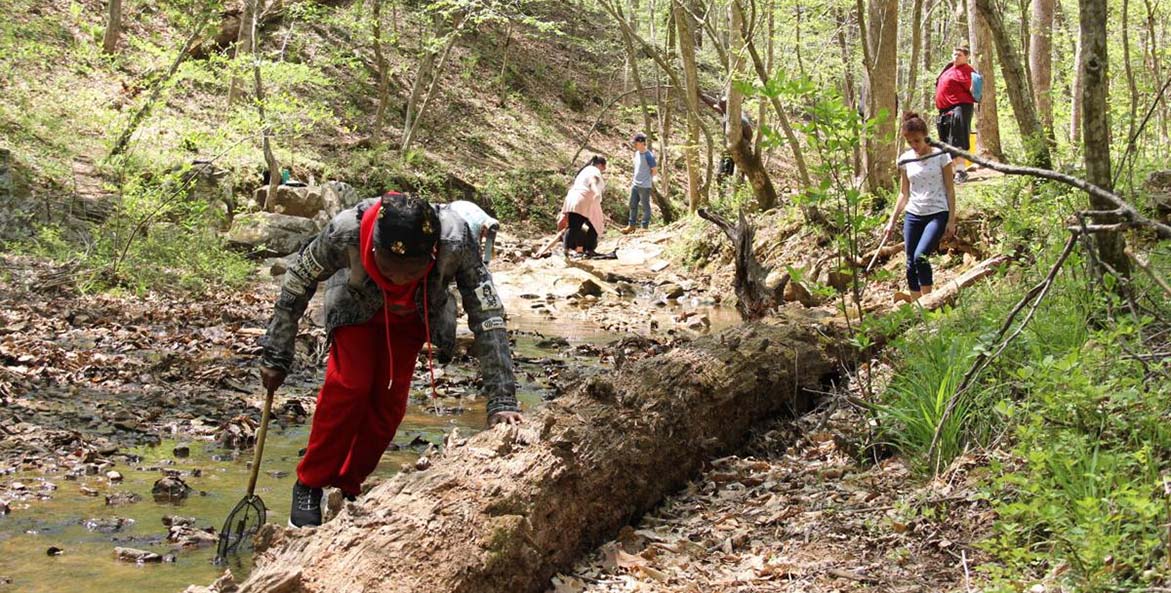The following was first published in the Richmond Times Dispatch.
For Kai Clarke-Peters, virtual school during the pandemic was like being stuck in a particularly boring time warp. "I couldn't learn anything. Every day felt like it was mushing into each other. It was so bland," said Peters, a student at Charlottesville High School.
Students and educators still are recovering from the upheaval of the past two years, compounded by the overnight shift to online learning. The fallout is wide-ranging—more stress and anxiety, less material learned, delayed social skills and technology fatigue, to name a few.
Getting students outside counteracts these problems. Time and again, research shows that hands-on outdoor education improves physical and mental health, builds social skills, enhances creativity and learning, and improves attention and focus.
As we emerge into a new normal, some students are experiencing the benefits of outdoor learning firsthand. This spring, Peters' biology class spent a day exploring forests and waterways just a few miles from school on a Chesapeake Bay Foundation field experience. It was a breath of fresh air.
"Outside is better," Peters said. "I need to feel, I need to see, I need to touch. It's not the same if I'm just sitting there looking at pictures on Google."
Schools today are suffering an outbreak of technology fatigue—the stress, tiredness and lack of motivation created by overuse of new technology. About two-thirds of educators and 72% of students have been fatigued by technology use during the pandemic, according to a December 2021 Education Week survey.
Spending unstructured time outside is the antidote to screen time overload. On that spring day in Charlottesville, Peters and classmates boarded canoes in groups of three on the Rivanna Reservoir, getting exercise and building teamwork as they coordinated paddling.
They walked through a sun-dappled forest, reducing stress and increasing focus. They caught crayfish while wading in a rocky creek with nets in hand, bringing to life a science lesson on habitat and healthy streams.
These high schoolers reaped the rewards of environmental education all school year under the guidance of teacher Erin Giebner. Being outside has helped her students unlock creativity, while building the reasoning skills that are necessary for learning.
"There's a lot of value in students being able to take their time and explore and observe," Giebner said. "Those are the biggest parts of being a scientist."
Giebner's environmental science class is focused on building student confidence and lab skills. She pairs classroom topics with related outdoor experiences, often just outside the high school.
After a recent indoor lesson on soil types, the students fanned out across school grounds with spades and shovels to dig soil samples. They then brought them back inside to analyze in the classroom's lab.
"Using pen and paper is not the only alternative to digital education," Giebner said. "There is a whole other world available where kids learn through experiences."
You don't have to go far to get started. Schools can offer outdoor education on their schoolyards or nearby natural settings.
There is training available for teachers interested in outdoor learning, including courses offered every summer by the Chesapeake Bay Foundation. School divisions can incorporate outdoor education into the curriculum for all students, making a huge difference for thousands of children growing up in the digital age.
There is something unforgettable about picking through clumps of eelgrass in search of crustaceans, feeling the rough scales of a sunfish with your thumb or painting your face with pungent marsh mud. Years later as adults, former students vividly recall field trips out in nature.
As we increasingly turn to technology to solve challenges in education and beyond, let's make sure we find a balance with tangible outdoor experiences. Overreliance on screen time robs us of something essential to discovering our place in the world.
Breaking out of the digital time warp helps us grow by focusing on the here and now. With outdoor education, the solution is all around us.
— Tom Ackerman, Vice President for Education, CBF



